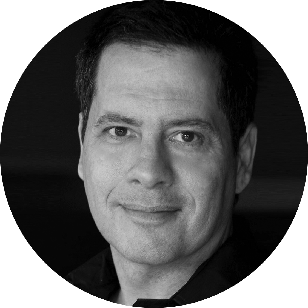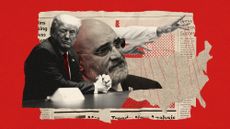The insidious message behind Joe Biden's call for 'unity'
He's insulting progressive voters with a dangerous false equivalence


If you live long enough to witness more than a few seasons of American politics you learn one thing for certain: Unity is a sucker's game. Unity is what they sell you when they're all out of justice. Unity is the little Fourth of July flag they hand you so you won't ball a fist.
That's the kind of unity Joe Biden pitched, high and tight — a threat as much as an offering — to a crowd of about 6,000 presumed supporters in the City of Brotherly Love on Saturday afternoon. Flanked by red, white, and blue signs that made the insistent rather than inspirational nature of his theme crystal clear by rendering it in the past tense (UNITED), Biden, as he has done throughout the early weeks of his campaign, made Trump his target, referring to him several times as the "divider-in-chief." He also, rather pointedly, promised that "You will not hear me speak ill of another Democrat."
The remarks by the relentlessly avuncular Biden had three main purposes: to double down on the argument that Trump is an aberration, the product of an uncharacteristic moment of undemocratic madness on the part of Biden's otherwise sane and patriotic "friends across the aisle;" to present himself as the candidate of restoration, the embodiment of the Good Old Days; and to make the case that the only way to beat Trump was with a "unity" that would brook no dissent, or even reasonable vetting.
Subscribe to The Week
Escape your echo chamber. Get the facts behind the news, plus analysis from multiple perspectives.

Sign up for The Week's Free Newsletters
From our morning news briefing to a weekly Good News Newsletter, get the best of The Week delivered directly to your inbox.
From our morning news briefing to a weekly Good News Newsletter, get the best of The Week delivered directly to your inbox.
The unmistakable message to Democratic voters was clear: FALL IN LINE.
A perhaps unintended corollary to Biden's message was also present in his remarks, and, as chilling as it was, it's difficult to see how he will be able to avoid expressing it again going forward. Biden repeatedly insisted that the anger Democratic voters feel is not only the enemy of all-important party unity but essentially the same as the anger felt by Trump supporters:
"Some of the really smart folks say Democrats don't want to hear about unity," Biden said. "They say Democrats are so angry, and that the angrier your campaign will be, the better chance you have to win ... Well, I don’t believe it. If the American people want a president to add to our division, to lead with a clenched fist, closed hand, a hard heart, to demonize the opponents and spew hatred — they don’t need me, they've got President Donald Trump."
Six months after a righteous rage-fueled blue wave swamped Republicans from coast-to-coast, and mere days after the anger of women everywhere spiked to DEFCON infinity over the barbarism let loose in Alabama, Ohio, Missouri, and Georgia, Biden was reducing the response of millions of Americans to the flagrant cruelty and systemic oppression inflicted upon them to mere "division." In his telling, the reactionary fury of people who want to put babies in cages, pregnant women in back alleys and people of color in their place is no different from the passion aroused in the folks whose lives they are destroying.
That kind of insidious false equivalence has been present in lots of historical calls for impunity — I'm sorry, unity — and it always serves the same masters.
An open letter titled "A Call for Unity" was issued by a group of eight moderate white clergymen in Birmingham, Alabama, on April 12, 1963, as a response to peaceful protests the previous day, led by Martin Luther King, Jr., who had been arrested along with 49 others. The clergymen called King's protests "unwise and untimely … extreme measures," that would "incite to hatred and violence, however technically peaceful those actions may be."
The next day, King answered "A Call for Unity" with his famous "Letter from Birmingham Jail," in which he wrote: "My citing the creation of tension as part of the work of the nonviolent resister may sound rather shocking. But I must confess that I am not afraid of the word 'tension.' I have earnestly opposed violent tension, but there is a type of constructive, nonviolent tension which is necessary for growth."
King understood that the only unity worth fighting for was one cemented with justice, and that the unity he was being asked to put his faith in was in actuality the opposite of brotherhood or devotion to common ideals. It was an insistence on not rocking the boat, on the powerless continuing to suffer in silence while the powerful reaped the benefits of their acquiescence. It was a cudgel in the shape of an olive branch.
Just six months after the Alabama clergymen's call for unity, on September 15, 1963, four young girls were killed when a bomb set by members of the Ku Klux Klan exploded at 16th Street Baptist Church in Birmingham. It was precisely the kind of cataclysm King had implicitly warned about in his letter, and, while it's impossible to speculate, it is one that we can at least imagine being less likely if those eight clergymen had made a call for solidarity rather than restraint, for a sense of common purpose with those who were clearly fighting for an authentic, if difficult to realize, unity, one that we are as far from achieving today as we were in 1963.
The choices facing the Democratic Party in 2019 and 2020 are not far removed from the choices facing those Birmingham clergymen in 1963. Democrats can choose to listen to the voices of those for whom the notion of unity has long been an empty promise, or they can buy what Uncle Joe is selling: The belief that lockstep devotion to the status quo is somehow a means of getting to a vaguely defined better world, that unity is how we will get justice, rather than the other way around.
Create an account with the same email registered to your subscription to unlock access.
Sign up for Today's Best Articles in your inbox
A free daily email with the biggest news stories of the day – and the best features from TheWeek.com
Peter Birkenhead is a writer who lives in Washington, D.C. His work has appeared in The Washington Post, The Daily Beast, the Los Angeles Review of Books, and other publications. He is the author of Gonville, a memoir published by Simon & Schuster.
-
 What are Lucy Letby's grounds of appeal?
What are Lucy Letby's grounds of appeal?In depth Convicted former nurse's legal team claims judge at original trial wrongly refused her applications
By The Week UK Published
-
 Grindr 'shared user HIV status' with ad firms, lawsuit claims
Grindr 'shared user HIV status' with ad firms, lawsuit claimsSpeed Read LGBTQ dating app accused of breaching UK data protection laws in case filed at London's High Court
By Rebecca Messina, The Week UK Published
-
 The best dog-friendly hotels around the UK
The best dog-friendly hotels around the UKThe Week Recommends Take a break with your four-legged friend in accommodation that offers you both a warm welcome
By Adrienne Wyper, The Week UK Published
-
 'Elevating Earth Day into a national holiday is not radical — it's practical'
'Elevating Earth Day into a national holiday is not radical — it's practical'Instant Opinion Opinion, comment and editorials of the day
By Harold Maass, The Week US Published
-
 'Republicans want to silence Israel's opponents'
'Republicans want to silence Israel's opponents'Instant Opinion Opinion, comment and editorials of the day
By Harold Maass, The Week US Published
-
 'A direct, protracted war with Israel is not something Iran is equipped to fight'
'A direct, protracted war with Israel is not something Iran is equipped to fight'Instant Opinion Opinion, comment and editorials of the day
By Harold Maass, The Week US Published
-
 'Good riddance to the televised presidential debate'
'Good riddance to the televised presidential debate'Instant Opinion Opinion, comment and editorials of the day
By Harold Maass, The Week US Published
-
 Why are Republicans trying to change Nebraska's Electoral College vote?
Why are Republicans trying to change Nebraska's Electoral College vote?Today's Big Question It's a chance for Donald Trump to block Joe Biden's path to re-election
By Joel Mathis, The Week US Published
-
 To win the election, Trump is changing how elections are run
To win the election, Trump is changing how elections are runUnder The Radar While the former president campaigns for a second term in office, he and his team have quietly been working to tilt the nation's electoral rules in his favor.
By Rafi Schwartz, The Week US Published
-
 Is it time to end arms sales to Israel?
Is it time to end arms sales to Israel?Today's Big Question Democrats urge restrictions following World Kitchen convoy deaths
By Joel Mathis, The Week US Published
-
 'What a difference a judge makes'
'What a difference a judge makes'Instant Opinion Opinion, comment and editorials of the day
By Harold Maass, The Week US Published